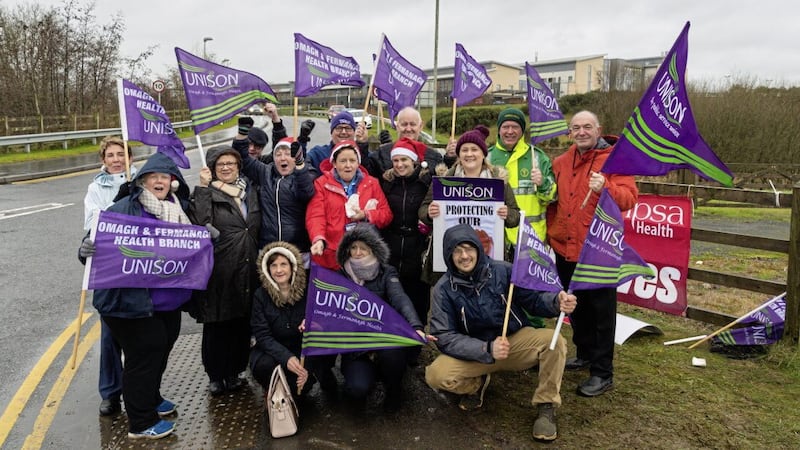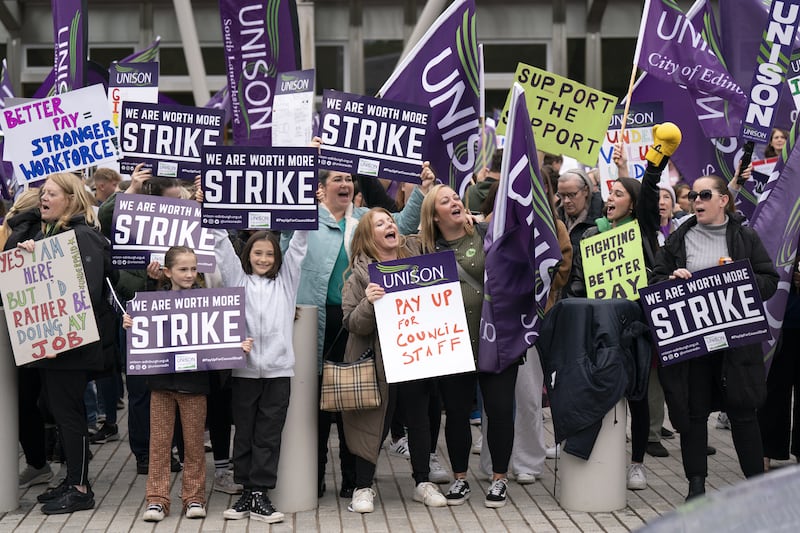HEALTH unions have promised patient safety will be maintained as they continue to "squeeze" the government over a pay deal.
Unison and Nipsa, who collectively represent more than 35,000 workers, have just finished a week of industrial action short of striking.
Full strike action is now planned from both unions on Monday before the Royal College of Nursing will also stage strikes on December 15 and 20.
Members of the GMB union will also be joining picket lines on Monday.
This week, civil servants approved long-delayed plans to give Northern Ireland health workers a £1,400 pay increase in line with England and Wales.
The unions say this is still well behind the 11 per cent rate of inflation and will not stop the strikes.
Speaking to the Irish News, Anne Speed from Unison called on health trusts to inform patients which services were likely to be affected on Monday.
“Our members are asking the trusts to make that statement publicly as you can’t have chaos," she said.
“That is a responsibility for the employers to announce that so the public know what to expect on Monday.”
On the impact of the industrial action this week, in which workers stick to their contracted hours, she said: “It has shown up a lot of gaps in terms of missing workforce and vacancies. It’s certainly showed how members go above and beyond their contract."
This week, the Royal Belfast Hospital for Sick Children in Belfast came under extreme pressure over increased concerns about Strep A infections.
It followed the death of five-year-old Belfast girl Stella-Lily McCorkindale who suffered complications after being infected with the bacteria.
Ms Speed said that Unison members had maintained "very close engagement" with the hospital.
“All that has been discussed and our members will act responsibly. They told me this morning there is a lot of derogations in place as we have to take account of what’s happening to our children and their worried parents," she said.
Most Unison members will be on a 12 hour strike, but this will vary across different Trusts depending on arrangements.
Nipsa’s Padraig Mulholland said that the industrial action so far has been "stretching management" in the health service.
After Monday, the union intends to stage more strike action before the end of the year and into 2023 unless a new pay deal is agreed.
“Throughout this whole process, we will also be maintain a high level of action short of strike action," he said.
He said a particular area of focus would be the South West Acute Hospital in Enniskillen, which recently announced a suspension of unplanned emergency surgery because of a difficulty in recruiting surgeons.
“At this moment in time I would say support for the industrial action is stronger than in 2019, there is a lot of real anger amongst people who feel they really went out on a limb during Covid.
“They certainly had not expected to come to the end of the Covid process and have their living standards slashed," he said.
“They are very angry towards the approach the government are taking. They don’t feel they’re getting a just settlement at all.”
He noted that in Scotland, a pay offer of £2,500 and up to £2,750 was currently being considered.
On the impact of this week's industrial action, he said: “It certainly is stretching management, because large parts if not all of the health service work on the basis of unpaid labour and good will.
“That means if people carry out only their contracted hours it does put the system under a lot of stresses and strains.
“There’s no question that’s beginning to tell already and that will intensify over a period of time."
He maintained that unions were committed to preserving patient safety and would not put lives at risk.
“It’s a balancing act between putting a very hard squeeze on the system and the government, but at the same time doing what health workers do best and ensuring the safety of patients.”








